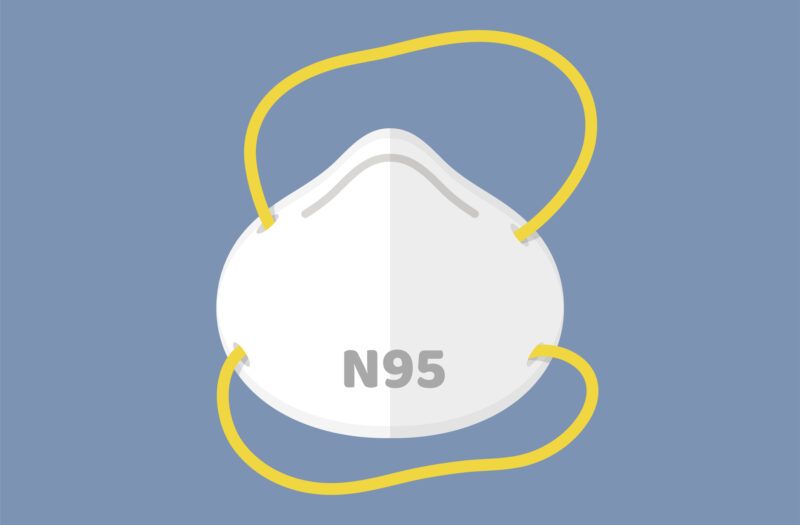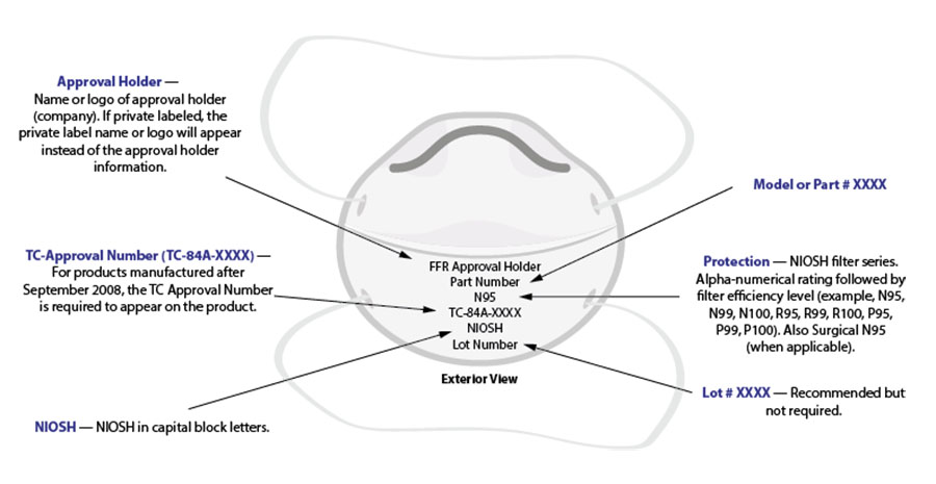Learn more about our FREE COVID-19 Patient Support Program for chronic illness patients and their loved ones.
By now, you’ve likely already heard that it’s best to upgrade your mask to an N95 or KN95 respirator during the Omicron variant wave of COVID-19. That’s because a respirator has better filtration and can provide a higher level of protection than a cloth or surgical mask when worn properly, per the U.S. Centers for Disease Control and Prevention (CDC).
A more protective respirator like an N95 may be particularly important for those at increased risk for severe illness, including people who are immunocompromised, older adults, and people with certain underlying medical conditions.
This may be especially critical as many states begin reversing mask mandates, which means that stores and other indoor public places may soon be filled with people who opt not to wear masks of any kind.
However, getting your hands on a coveted N95 or KN95 mask (which are often pricier than the average cloth or medical mask) is a different story. There have been reports of frustration among the immunocompromised who are having trouble finding these masks.
According to a recent poll of our COVID-19 Patient Support Program, nearly 25 percent of survey respondents said they have had difficulty accessing N95 or KN95 masks during the surge due to the Omicron variant. “You can’t get a single mask,” one member of the Global Healthy Living Foundation told us on Facebook. “They come in [bulk] boxes and they are expensive.”
Here’s some good news: At the end of January, the White House started distributing 400 million N95 masks for adults free of charge, an initiative that’s continuing to roll out in pharmacies this month.
That said, it can be tricky to know where to look for these free masks (or distinguish the real ones from fakes, if you’re purchasing). Here’s how you can get your hands on an authentic respirator, like an N95 mask, if you’re immunocompromised.
Where to Get a FREE N95 Mask
Many pharmacies participating in the Federal Retail Pharmacy Program are part of the government’s free N95 mask program, per MarketPlace, a nonprofit business and economic news source.
Some pharmacies that have planned to distribute the free masks, while supplies last, include:
- Albertsons Companies (including Osco, Jewel-Osco, Albertsons, Albertsons Market, Safeway, Tom Thumb, Star Market, Shaw’s, Haggen, Acme, Randalls, Carrs, Market Street, United Supermarkets, Vons, Pavilions, Amigos, Lucky, Pak ’N Save, Sav-on)
- CPESN network pharmacies (find one near you here)
- Select CVS pharmacies (use this store locator to see all locations)
- Giant Food (see list of participating stores in this spreadsheet)
- Select Good Neighbor Pharmacy network locations (this is a network of independent community pharmacies; find one near you here)
- Hannaford Bros. Co. (see list of participating stores in this spreadsheet)
- H-E-B (use this store locator)
- Hy-Vee (use this store locator)
- Kroger Co. and subsidiaries (like Fry’s or Smith’s Food and Drug) (use this store locator)
- Meijer
- Publix (use this store locator)
- Rite Aid (use this store locator)
- Southeastern Grocers (Winn-Dixie, Harveys Supermarket, Fresco Y Más)
- Walgreens and Duane Reade (see list of participating stores here)
- Walmart and Sam’s Club (use this Walmart store locator and this Sam’s Club store locator)
Before going, call your local pharmacy to enquire if they have free N95 masks, which are limited to three per person. Some companies have reported receiving masks in waves, so if they don’t have any available right now, ask if they’re expecting a shipment.
If You’re Buying, Double Check Authenticity
It’s best to purchase N95 masks from a trusted source. For instance, Project N95 is the National Clearinghouse for personal protective equipment and COVID-19 tests (though due to demand, some orders may currently take up to 10 days to ship after purchase).
Even if you don’t purchase from Project N95, it’s a great resource for information — such as how to choose the shape of your N95. For instance, a Flat Fold N95 is easy to put on and conforms to your face, while Comfort Duckbill N95 Masks provide extra breathing space, per the organization.
You can also find respirators from several retailers. The New York Times tested 39 models of masks and confirmed the filtration claims of the top masks with government agencies and lab testing performed in collaboration with Colorado State University. A few of the N95, KN95, and KN94 masks that made the list include:
- WellBefore N95 Medical Respirator Mask ($1.56 each; WellBefore)
- Kimberly-Clark PROFESSIONAL N95 Pouch Respirator ($55.80 per pack of 50; Amazon)
- White Powecom® KN95 Respirator Face Mask ($12 per pack of 10; Bona Fide Masks)
- Puri New Micro-Dust Protection Face Premium Mask (KF94) ($31.99 per pack of 20; Amazon)
(See “Look for Quality KF94 or KN95 Masks as an Alternative” below to learn more about the differences between these masks).
The CDC also provides a list of NIOSH-approved N95 respirator manufacturers. NIOSH stands for the National Institute of Occupational Safety and Health, which is a division of the CDC.
NIOSH-approved respirators should have an approval label, either on or within the packaging of the respirator (say, on the box and/or within the instructions). Plus, you should find an abbreviated approval on the respirator itself. You can double check the approval number on the NIOSH Certified Equipment List (CEL) or the NIOSH Trusted-Source page from the CDC to make sure the respirator has been approved by NIOSH.
NIOSH-approved filtering facepiece respirators (FFRs) always have one the following designations: N95, N99, N100, R95, R99, R100, P95, P99, or P100.
Here is a sample of a generic FFR with the right markings:
There are also a few key ways you can spot a counterfeit N95, per the CDC:
- It doesn’t have markings on the filtering facepiece respirator
- It doesn’t have an approval (TC) number on the filtering facepiece respirator or headband
- It doesn’t have NIOSH markings
- NIOSH is spelled incorrectly
- It has decorative fabric or other decorative add-ons (like sequins)
- It claims to be approved for children (NIOSH does not approve any type of respiratory protection for children)
- Filtering facepiece respirator has ear loops instead of headbands
Once you have your N95 mask, be sure to store it in a way that doesn’t affect its shape (and therefore its fit to your face).
“With most N95s, they are molded and so need to be stored in a way so that they won’t get deformed,” says Stella Hines, MD, Associate Professor in the Division of Occupational and Environmental Medicine at the University of Maryland School of Medicine. Dr. Hines was also part of N95Decon, a volunteer collective of scientists, engineers, clinicians, and students from universities as well as other professionals in the private sector that aimed to synthesize and disseminate scientific information on respiratory protection at the start of the pandemic.
Look for Quality KF94 or KN95 Masks as an Alternative
Although N95 masks are the professional go-to in the United States, KF94 and KN95 masks will still offer good protection.
“N95 masks, if they are real, offer the most protection and are what we use in health care for people with known COVID-19,” says Jean Liew, MD, Assistant Professor of Medicine at Boston University School of Medicine and member of the COVID-19 Global Rheumatology Alliance (GRA). “However, since N95 masks may be difficult to find, expensive to purchase, or more uncomfortable to wear, a well-fitting and approved KF94 or KN95 is a good alternative.”
The KF94 mask is made in Korea and folds flat, per the New York Times. The KF stands for “Korean filter,” while the 94 signifies that it filters 94 percent of particles. Although the masks are heavily regulated in Korea, some counterfeits may still be made in China and labeled as KF94.
The more commonly known KN95 mask meets a Chinese criteria for respirator protection. It typically has a vertical flat-fold shape with ear loops. Like the N95 standard, it can filter up to 95 percent of particles in the air.
“On paper, the Chinese KN95 standard seems equivalent to the U.S. per the N95 standard,” according to N95Decon. “But KN95s sold in the United States have suffered from a range of small and large quality problems that are not characteristic of N95s or KF94s.”
Quality issues may include broken ear loops or detached metal strips. It’s also worth considering what types of mask straps offer the best protection for you.
“I think one of the key things to consider with respect to KN95s is that none of them have straps that go around the back of the head,” says Dr. Hines. “They all have ear loops. These, in general, tend to not provide as reliable of a fit to the face as do the head straps of N95s.”
Plus, about 60 percent of KN95 respirators in the United States are counterfeit and don’t meet NIOSH standards, per the CDC. It’s a bit trickier to tell a counterfeit KN95 mask apart from an authentic one, but one big clue is if it’s printed with “NIOSH” — as KN95 masks are not generally evaluated by NIOSH. Your best bet is to purchase a KN95 mask from a trusted source.
N95Decon, like The New York Times, recommends the Powecom® KN95 from WellBefore. An authentic KN95 mask is likely better than other masks — and quality KN95s may meet similar performance expectations as N95s.
“The filtration material is very similar to N95 material, so the key difference from a protection standpoint is whether or not the fit is good,” says Dr. Hines. “Even an imperfect fit, however, will likely provide more protection to the user, and to those around them, than a loose-fitting cloth mask or loose-fitting surgical mask. That is a key benefit of a KN95.”
Get Free Coronavirus Support for Chronic Illness Patients
Join the Global Healthy Living Foundation’s free COVID-19 Support Program for chronic illness patients and their families. We will be providing updated information, community support, and other resources tailored specifically to your health and safety. Join now.
Chen J. Where to Buy N95s, KN95s, and Surgical-Style Masks in 2022. The New York Times Wirecutter. January 25, 2022. https://www.nytimes.com/wirecutter/reviews/where-to-buy-n95-kn95-masks-online.
Counterfeit Respirators / Misrepresentation of NIOSH-Approval. The National Personal Protective Technology Laboratory (NPPTL). U.S. Centers for Disease Control and Prevention. January 31, 2022. https://www.cdc.gov/niosh/npptl/usernotices/counterfeitResp.html.
High-Performance COVID-19 Masks. N95DECON. May 4, 2021. https://static1.squarespace.com/static/5e8126f89327941b9453eeef/t/6092c307d3c5736f61f0e83d/1620230919796/20210504_HighPerformanceCOVID19Masks_N95DECON_v1_final-compressed.pdf.
Interview with Jean Liew, MD, Assistant Professor of Medicine at Boston University School of Medicine and member of the COVID-19 Global Rheumatology Alliance (GRA)
Interview with Stella Hines, MD, associate professor in the Division of Occupational and Environmental Medicine at the University of Maryland School of Medicine
Nguyen H. Want a free N95 mask? Here’s a list of companies distributing them. Marketplace. February 4, 2022. https://www.marketplace.org/2022/02/04/want-a-free-n95-mask-heres-a-list-of-companies-distributing-them
NIOSH-Approved Particulate Filtering Facepiece Respirators. The National Personal Protective Technology Laboratory (NPPTL). U.S. Centers for Disease Control and Prevention. September 15, 2021. https://www.cdc.gov/niosh/npptl/topics/respirators/disp_part/default.html.
Pharmacies Participating in the Federal Retail Pharmacy Program. Vaccines & Immunizations. U.S. Centers for Disease Control and Prevention. August 24, 2021. https://www.cdc.gov/vaccines/covid-19/retail-pharmacy-program/participating-pharmacies.html.
Parker-Pope T. How to Find a Quality Mask (and Avoid Counterfeits). The New York Times. January 14, 2022. https://www.nytimes.com/article/covid-masks.html.
The Project N95 Mask Guide. ProjectN95. Accessed February 9, 2022. https://shop.projectn95.org/find-the-right-mask.
Types of Masks and Respirators. COVID-19. U.S. Centers for Disease Control and Prevention. January 28, 2022. https://www.cdc.gov/coronavirus/2019-ncov/prevent-getting-sick/types-of-masks.html.







